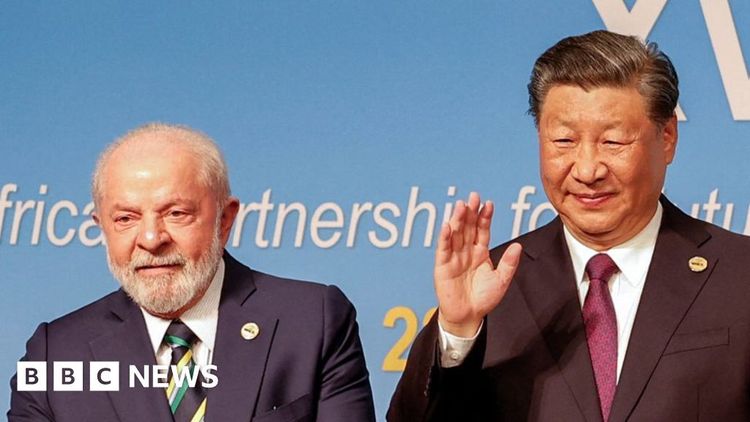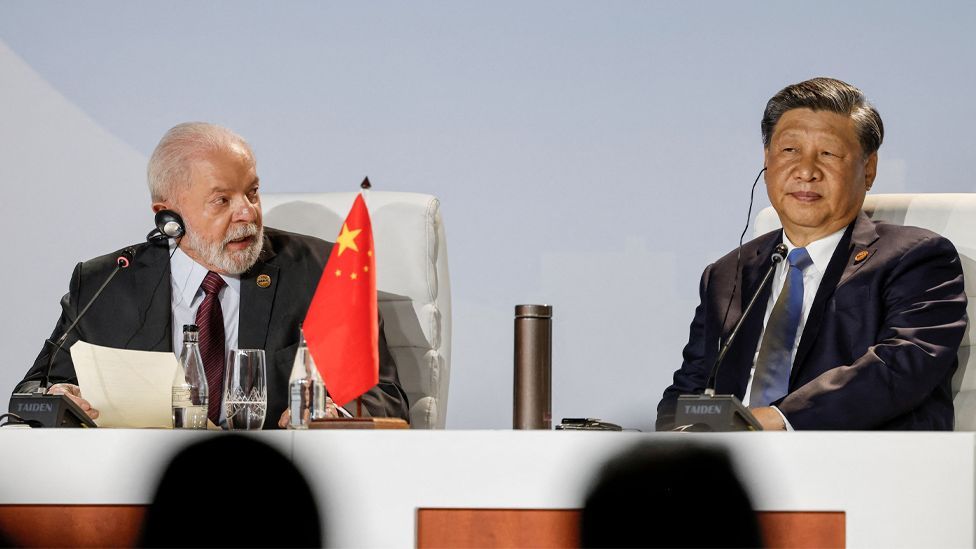Why is Brazil's Lula building Brics?

Pictures courtesy of Getty Images
Lula's Brazil is eager to support the Brics alliance, but it is overshadowed by Xi Jinping's powerful China.

It has been over 18 months since Luiz Inácio Lula da Silva made a comeback to Brazil's presidency, defying the odds after his corruption conviction was unexpectedly overturned.
During that period, President Lula's return has revitalized one of the world's most unexpected economic partnerships - the Brics, which brings together Brazil, Russia, India, China, and South Africa.
During his time as president from 2003 to 2010, Lula played a key role in uniting the Brics countries as a geopolitical force, challenging the dominance of the West.
The group is gaining momentum once more. It is now referred to as Brics Plus, as the original members decided at a significant meeting in Johannesburg last August to allow new countries like Saudi Arabia and Iran to join.
Pretty impressive considering that this grouping was initially created on a whim based on financial ideas. It was the brainchild of economist Jim O'Neill, who saw it as an investment opportunity rather than a coalition of new nations.
According to Monica de Bolle, a senior fellow at the Peterson Institute for International Economics in Washington, when the Brics were first introduced, they were mainly seen as a type of investment category.
"But it became popular in Brazil because it addressed Lula's goals in foreign affairs."
During the meeting in Johannesburg, Lula showed a lot of confidence in the group's future economic outlook.
"We have already exceeded the economic power of the G7 countries and make up 32% of the world's GDP in terms of purchasing power," he stated.
The prediction is that emerging markets and developing markets will experience the most growth in the upcoming years.
This demonstrates that the economy in the southern hemisphere is booming and the Brics countries are leading the way.
However, Lula's claim is not entirely truthful. The creator of the Bric acronym, now known as Baron O'Neill of Gatley, highlights that the economic expansion within the group is primarily due to China's Xi Jinping and India's Narendra Modi.
"He mentioned in an article responding to the bloc's growth that none of the other Brics have done as good as those two countries," said the writer.
Brazil and Russia still contribute approximately the same portion of the world economy as they did back in 2001. Interestingly, South Africa is no longer the biggest economy in Africa, as Nigeria has now taken that title.
As he mentions, China is the largest member of the Brics group, being twice as large as all the other members put together. This is similar to how the US is the dominant country in the G7.
What benefits does Brazil, a country experiencing slow economic growth, derive from being influenced by China's economic progress?
Rodrigo Zeidan, an economist from Brazil teaching at New York University Shanghai in China, explains to the BBC that both Brazil and China view the Brics as a way to safeguard themselves against changes in global partnerships, rather than as a main focus.
"The current price of the Brics for Brazil is almost negligible," he explains. "Therefore, if the advantages are minimal, that's okay. They don't offer significant advantages or disadvantages."
Because China is the largest country Brazil trades with, Brazil finds it easy to keep a close relationship with Beijing, even though being part of the Brics grouping brings them some "unexpected allies", according to Mr. Zeidan.
Lula has consistently held a neutral stance on Russia's conflict in Ukraine, which is mainly because of Brazil's traditional policy of staying out of foreign affairs rather than a desire to side with a fellow Brics country.
According to Brazilian economist Monica de Bolle from the Peterson Institute, President Lula demonstrated a great deal of innocence when he decided to join the Brics with the belief that it would strengthen ties among the major countries in the global south.
In conclusion, Brazil has developed a strong reliance on China that may negatively impact its foreign policy dealings with other countries, according to her.
"If you live in the United States, you are aware that the US position on China will remain the same regardless of who is elected president in November," she mentions.
Either way, the situation is leaning towards increased negative feelings towards China. This could prompt further responses from China, potentially placing Brazil in a challenging situation as it is seen as being supportive of China.
The New Development Bank has given funding to help with reconstruction efforts following floods in the southern part of Brazil.
One concrete benefit for Brazil from the partnership is the New Development Bank (NDB), a financial institution established by the Brics countries and hailed by Lula as a significant step towards successful cooperation among emerging economies.
Brazil's current leader is Dilma Rousseff, who used to be the president of Brazil. She was mentored by President Lula and took over from him in 2011. However, her presidency ended in turmoil in 2016 when she was removed from office for violating budget laws.
The National Development Bank (NDB) has not just brought her back into the spotlight, but being based in Shanghai, it positions her as crucial in keeping the connections strong between Brazil and China.
According to Mr Zeidan, Dilma is a significant political figure with a strong image. Her presence in Shanghai is crucial for enhancing the relationship between Brazil and China.
Brazil has also received direct assistance from NDB funding. In June, Ms. Rousseff and Brazilian Vice-President Geraldo Alckmin agreed to a loan of over $1.1 billion to aid in the rebuilding efforts following devastating floods in Rio Grande do Sul.
In March 2022, the NDB halted all transactions with Russia following their invasion of Ukraine. The bank has also followed international sanctions imposed on Russia.
However, there is a possibility that Russia will assume the rotating leadership of the bank in the middle of 2025, which may bring about some uncertainty regarding future developments.
Meanwhile, Ms. Rousseff is open to participating in financial events in Russia and meeting with Russian President Vladimir Putin. Putin has commended her leadership at the NDB.
Dilma Rousseff and Vladimir Putin meet in St Petersburg in June 2024.
President Lula strongly believes in the importance of the Brics for improving global governance and amplifying the voices of developing countries.
He has spoken out against the inaction of global organizations, while also applauding the growth of the Brics group for enhancing the push for a wider range of viewpoints.
However, some critics argue that the Brics are hindered by their own internal conflicts, such as Russia's involvement in Ukraine and ongoing disputes between China and India.
In the end, Ms de Bolle from Washington points out that the Brics are a diverse collection of nations with no similarities, other than their size.
Mr Zeidan in Shanghai believes that the Brics do not have a definite plan that holds any significant importance.
Currently, China does not demand a lot from Brazil. But whatever requests China makes, Brazil complies with them.
"It's easy to be a member of Brics when things are going smoothly. But what happens when the situation becomes more challenging?"
Simply put, the impact of the Brics on Brazil and the global community might be insignificant at the moment. However, if China decides to take a more aggressive stance, the situation could quickly evolve, forcing Brazil to make tough decisions.









































